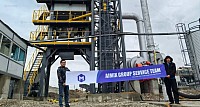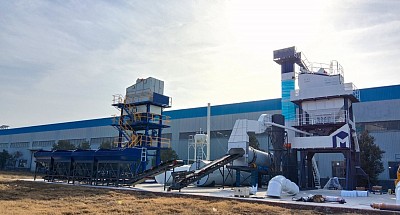Economic Benefits of Improved Production Efficiency in Asphalt Mixing Plants
Reducing Operational Costs
One of the most immediate economic benefits of improved production efficiency in asphalt mixing plants is the reduction of operational costs. Enhanced efficiency often leads to lower energy consumption and reduced material waste, which directly impacts the overall cost of asphalt production. Customers can benefit from these savings, as lower production costs allow for more competitive pricing on their projects.
For instance, when a stationary asphalt mixing plant implements advanced technologies that optimize the mixing process, it can produce asphalt with less energy and fewer raw materials. This reduction in resource consumption not only lowers the asphalt plant price but also enables customers to bid more competitively on contracts. By minimizing expenses, customers can increase their profit margins while maintaining high-quality standards.
Additionally, mobile asphalt mixing plants that operate with improved efficiency can reduce transportation costs associated with moving materials. This flexibility allows customers to operate in various locations without incurring excessive logistical expenses, further contributing to overall cost savings.
Accelerating Project Timelines
Improved production efficiency also leads to faster project completion times, which is a significant economic advantage for customers. When asphalt mixing plants operate at higher efficiency levels, they can produce larger quantities of asphalt in a shorter period. This capability allows construction teams to complete projects more quickly, reducing labor costs and enabling clients to meet tight deadlines.
For example, when a customer utilizes a high-efficiency mini asphalt mixing plant, they can expect quicker turnaround times for their projects. This acceleration not only enhances customer satisfaction but also opens up opportunities for additional contracts. Projects that are completed on time can lead to repeat business, as clients are more likely to return to suppliers who demonstrate reliability and efficiency.
Moreover, the ability to expedite project timelines can be especially beneficial in competitive bidding situations. Customers who can promise faster delivery and completion are more attractive to potential clients, allowing them to secure more contracts and expand their market presence.
Enhancing Product Quality and Consistency
Another critical aspect of production efficiency is its impact on product quality and consistency. When asphalt mixing plants utilize advanced technologies to streamline their operations, they can produce asphalt with greater precision. This consistency in quality not only boosts customer satisfaction but also reduces the likelihood of costly rework or repairs.
Customers who invest in high-efficiency asphalt plants benefit from superior quality asphalt that meets stringent industry standards. This quality assurance can lead to longer-lasting road surfaces and reduced maintenance costs over time. By ensuring that the asphalt used in their projects is of the highest standard, customers can enhance their reputation in the industry, attracting more business opportunities.
Additionally, suppliers that offer products with consistent quality can often command higher prices, allowing customers to improve their profitability. When customers can confidently provide high-quality asphalt, they position themselves as trusted partners in the construction process, which can lead to long-term relationships and increased market share.
Conclusion
The improvement in production efficiency of asphalt mixing plants offers substantial economic benefits for customers. By reducing operational costs, accelerating project timelines, and enhancing product quality, these advancements enable customers to achieve greater profitability and success in their projects. As the construction industry continues to evolve, investing in efficient asphalt production technologies will be essential for customers looking to maintain a competitive edge and secure their place in the market. Embracing these innovations not only leads to immediate economic advantages but also fosters long-term growth and sustainability in the asphalt sector.


